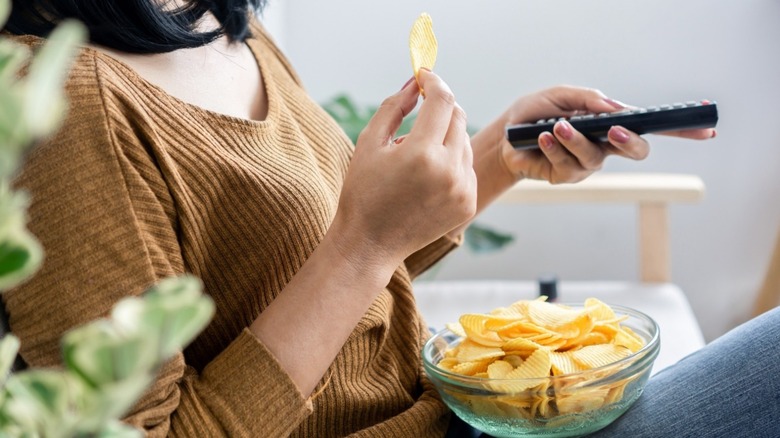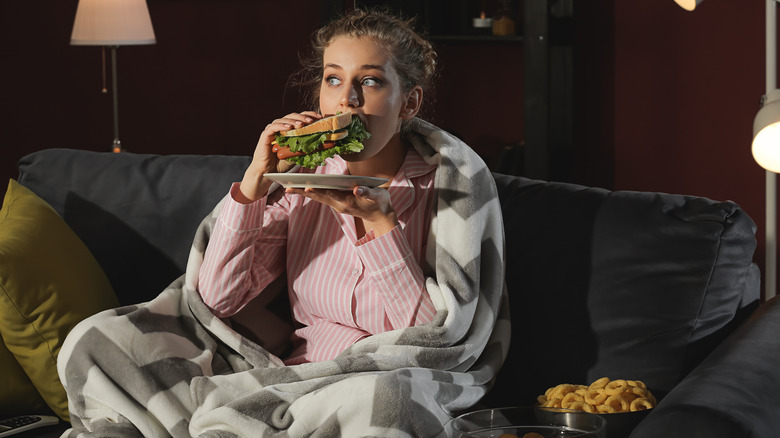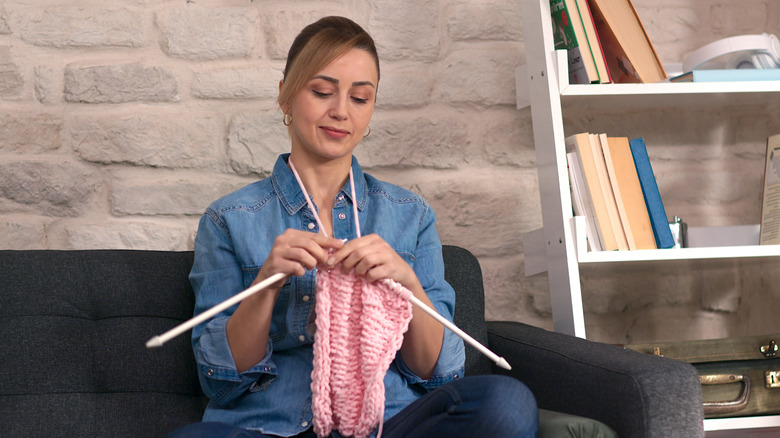Why It's So Easy To Overeat While Watching TV, According To A Dietitian
Can you imagine life without TV? As the television was invented in 1927 (via the History Channel), very few of us were actually around before TV existed. According to the U.S. Bureau of Labor Statistics (an organization that also appears to be in the business of collecting leisure statistics), Americans aged 15 and oever watch nearly three hours of TV per day, which also includes streaming videos. Multitaskers that we are, quite a few of us have a number of our meals in front of the TV as well. In fact, TV dinners have been around nearly as long as TV has, so even our great-grandparents may have dined by the light of the flickering tube.
However, one thing to consider is that it can be easy to overeat when watching TV. Mashed spoke with Amy Shapiro, MS, RD, CDN, who is the founder of Real Nutrition: She shared with us some of her insights about how TV can affect eating habits and offered a few tips on how to address it.
How does watching TV influence the way people eat?
When we're watching TV, it's easy to zone out and lose track of time. Well, it seems that's not the only thing someone might lose track of. Shapiro tells us, "When you eat in front of the TV, you're focused on something besides the food you are eating, and your body signals on how full or satisfied you are." While distracted eating may not pose a threat like distracted driving, it can still have unintended or unwanted consequences. As Shapiro explains, "When you are distracted, you continue to eat until it's too late and you['ve] either finished the entire bag or are too full."
Another factor contributing to the tendency to keep eating when binging a favorite show may be the length of the program. The way Shapiro sees it, "If you are watching an hour-long show, you might eat for that entire hour." So settling in for, say, an 8-hour movie marathon, could make overeating more likely. And Shapiro says that "you likely don't realize it."
Tricks to cut down on eating in front of the TV
Shapiro tells us that the best way not to overindulge while watching your favorite shows is to simply "make a rule that you can not eat in front of the TV!" As to how you can ward off the temptation to snack, she suggests you "Keep your hands busy with something else like knitting, playing with a fidget, lifting light weights, painting your nails, etc."
If you don't want to adopt such an approach, she does have a few other tips to limit munching. One option, she says, is to put a time constraint on TV meals, explaining that "a cut off time will prevent you from continuing to eat." She also advises against eating out of the box or bag and instead advocates portioning food using a plate or bowl. She also recommends no going back for seconds. One more thing you can do is to make high-volume foods your go-to for TV grazing. These are foods that Shapiro says "you can eat a lot of so it takes a while to eat and will last for much of the program you are watching."
Ideas for TV snacking
Shapiro has several snack suggestions for eating while you watch TV. One of her top recommendations is air-popped popcorn, something that Self Nutrition Data says has 31 calories per cup. So a 4-cup serving (no butter) would be about 120 calories. Roasted pistachios made the list as well. Healthline provides the info that a 1-ounce serving (around 50 nuts) has approximately 160 calories. As Shapiro points out, "Working with the shells takes time." She also suggests fruits and vegetables since "they are filled with water and fiber but low in calories so they will keep you full but at no cost!" (Calorie cost, that is, unless you're also picking the produce fresh from your own garden.)
If you're more of a sweet snacker than a salty one, Shapiro recommends popsicles or ice cream bars. "I like [ice] pops because they are portion-controlled," she says, adding that "they also come in lots of healthy varieties and take a while to eat." Shapiro also recommends having a drink to go with your snack. No, not an alcoholic one! Instead, she advises, "Water, tea, [and] seltzer are all great calorie-free beverages that will keep your hand/mouth busy in a healthy way." Tea, she says, is her favorite, explaining that "it can have functional benefits like promoting sleep, digestion, etc."



